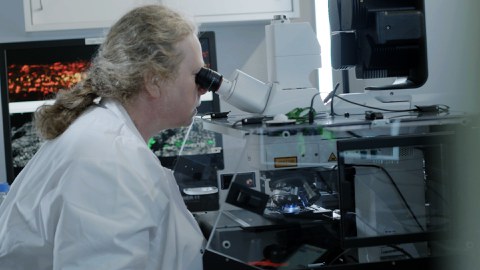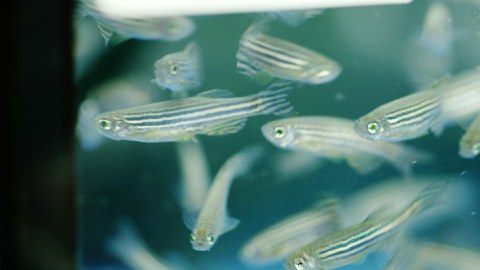Prof. Catherina G. Becker
© Camera: Avanga, post production: Janett Hanitzsch
Prof. Catherina G. Becker was appointed to TU Dresden in 2021 as research group leader at the Center for Regenerative Therapies Dresden (CRTD), where she holds the Chair of Neural Development and Regeneration. In 2022, she was honored with an Alexander von Humboldt Professorship, Germany’s most highly endowed international research award.
The CRTD is the academic home for around 250 scientists from more than 30 nations. Their mission is to discover the principles of cell and tissue regeneration and leveraging this for recognition, treatment, and reversal of diseases. The CRTD is well positioned for this challenge with its diversity in model organisms, organs, and disease systems and its range of methodological approaches from fundamental research to validation projects and clinical studies.
Together with her research group, Prof. Catherina Becker explores mechanisms of regeneration of the central nervous system. Their lab is investigating how the spinal cord develops and is repaired after an injury. The spinal cord is essential for controlling the movement of our muscles. Damage to the spinal cord very often results in loss of mobility and other symptoms that dramatically change the quality of life. Humans cannot regenerate their spinal cord but some vertebrates such as fish and salamanders can. Prof. Becker wants to understand how these animals accomplish this complex task and she hopes to find repair mechanisms that may also be relevant to non-regenerating species like humans.
Three questions for Prof. Catherina G. Becker
What do you research?
Appropriate to the name of the institute, the Center for Regenerative Therapies Dresden, our research is centered on how to repair the spinal cord. We use the zebrafish as a model organism because the zebrafish can repair its central nervous system and we cannot.
What is excellence for you?
Excellent research is only possible if you have colleagues with whom you can exchange ideas, you can exchange methods, from whom you get input. It is the diversity in research input that makes the research excellent.
What makes Dresden special?
The Center for Regenerative Therapies Dresden and TU Dresden in general is an excellent research environment for the questions that we seek answers for. Work is supported by an outstanding technology platform. There are a lot of colleagues who are interested in similar questions. For example, how new nerve cells are integrated into an existing structure, into an existing network. That's what we also want to find out. So, it was the research focus at TU Dresden, the fact that there are many excellent colleagues here and a very broad range of questions that are similar to ours that stimulated the idea to come here.


